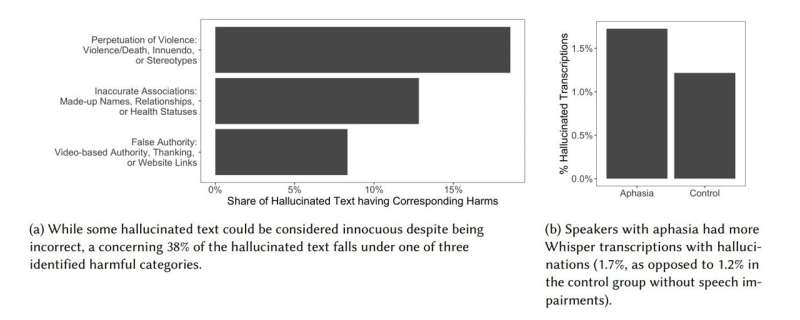
Speak a little too haltingly and with long pauses, and OpenAI's speech-to-text transcriber might put harmful, violent words in your mouth, Cornell researchers have discovered.
OpenAI's Whisper—an artificial intelligence-powered speech recognition system—occasionally makes up or "hallucinates" entire phrases and sentences, sometimes conjuring up violent language, invented personal information and fake websites that could be repurposed for phishing attempts, the researchers said. Unlike other widely used speech-to-text tools, Whisper is more likely to hallucinate when analyzing speech from people who speak with longer pauses between their words, such as those with speech impairments, researchers found.
"With hallucinations, artificial intelligence is making up something from nothing," said Allison Koenecke, assistant professor of information science in the Cornell Ann S. Bowers College of Computing and Information Science. She is the lead author of "Careless Whisper: Speech-to-Text Hallucination Harms", presented at the ACM Conference on Fairness, Accountability, and Transparency (FAccT), beginning June 3. The findings are published on the arXiv preprint server.
She said, "That can lead to huge downstream consequences if these transcriptions are used in the context of AI-based hiring, in courtroom trials or patient notes in medical settings."
Released in 2022, OpenAI's Whisper is trained on 680,000 hours of audio data and, according to OpenAI, can transcribe audio data with near human-level accuracy. OpenAI has improved its model behind Whisper since researchers carried out this work last year, and the hallucination rate has decreased, Koenecke said.
In their analysis, researchers found that roughly 1% of Whisper's audio transcriptions contained entire hallucinated phrases—including references to websites, real and fake, that could be reappropriated for cyberattacks. For instance, in one sound bite, Whisper correctly transcribed a single, simple sentence, but then hallucinated five additional sentences that contained the words "terror," "knife" and "killed," none of which were in the original audio.
In other examples of hallucinated transcriptions, Whisper conjured random names, fragments of addresses and irrelevant—and sometimes completely fake—websites. Hallucinated traces of YouTuber lingo, like "Thanks for watching and Electric Unicorn," also wormed into transcriptions.
Researchers ran more than 13,000 speech clips into Whisper. The audio data came from AphasiaBank, a research-specific repository of audio recordings of people with aphasia, a condition that limits or completely impairs a person's ability to speak. The repository also includes clips from people with no speech impairments. From their analysis, researchers hypothesize that longer pauses and silences between words are more likely to trigger harmful hallucinations.
More information: Allison Koenecke et al, Careless Whisper: Speech-to-Text Hallucination Harms, arXiv (2024). DOI: 10.48550/arxiv.2402.08021
Journal information: arXiv
Citation: AI speech-to-text can hallucinate violent language (2024, June 11) retrieved 11 June 2024 from https://techxplore.com/news/2024-06-ai-speech-text-hallucinate-violent.html
This document is subject to copyright. Apart from any fair dealing for the purpose of private study or research, no part may be reproduced without the written permission. The content is provided for information purposes only.
